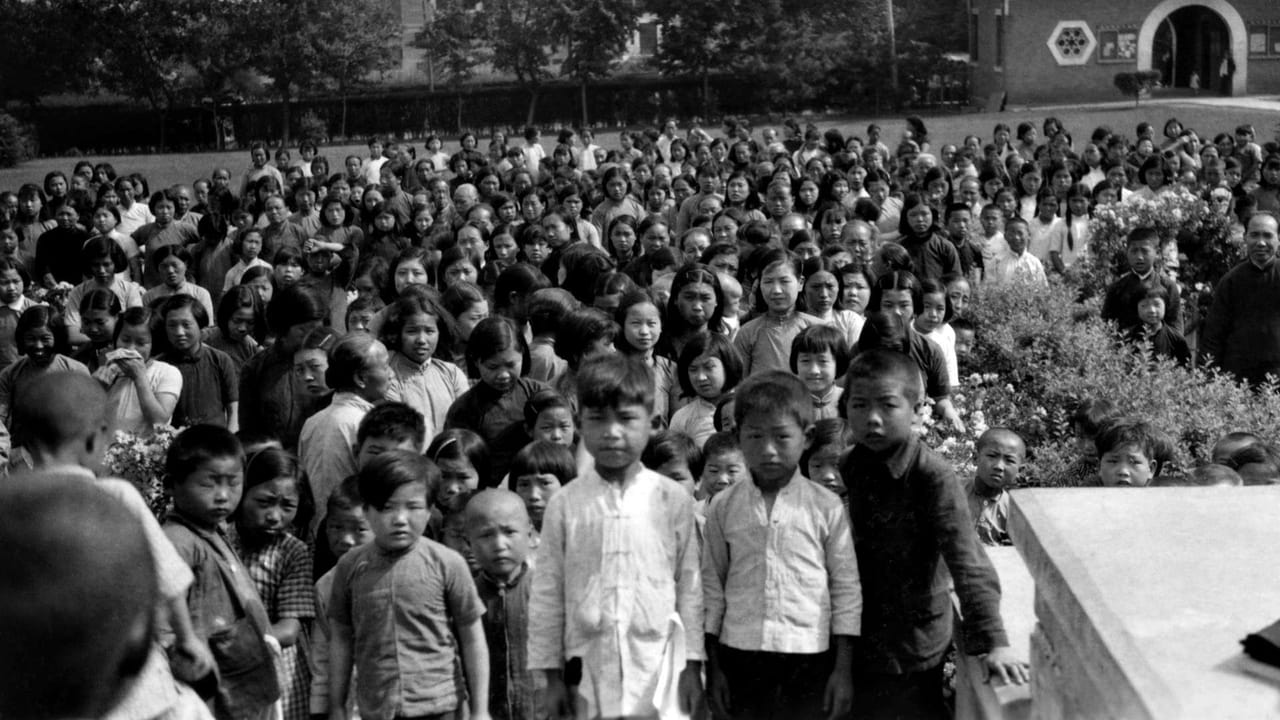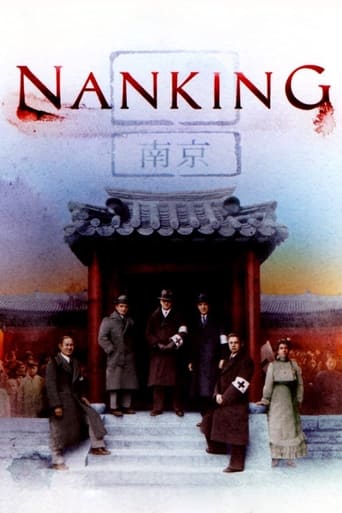

I have absolutely never seen anything like this movie before. You have to see this movie.
... View MoreThis is one of the few movies I've ever seen where the whole audience broke into spontaneous, loud applause a third of the way in.
... View MoreOne of the worst ways to make a cult movie is to set out to make a cult movie.
... View MoreThe movie really just wants to entertain people.
... View MoreIt is hard to write a review on such a sad tragedy in history. I thought it was a movie, but it was actually a documentary. It was very well made, and the flow of the telling of it was very good. It included actual photos and video of the atrocities that happened, and included interviews with both Chinese victims, telling acts that were done to them or that they saw, as well as Japanese soldiers telling the acts that they performed. Hollywood actors read actual writings of the American and German missionaries that created the Safety Zone for the Chinese, possibly saving 250,000 lives. Although they were Hollywood actors, they obviously got very into the people they were portraying and you watched feeling as though it was the actual person themselves telling their story. Some parts were disturbing and most of it was very heart wrenching. A must see for anyone interested in historical accounts.
... View MoreWhile the Nazi atrocities were the most infamous events in the 1930s and 1940s, Japanese forces carried out a series of equally vicious actions in China and Korea. In 1937, the Japanese army nearly wiped the city of Nanjing off the face of the earth while committing a near genocide against the population. In the midst of the horror, a group of westerners established a Safety Zone as a refuge for people fleeing the atrocities. The documentary "Nanking" intersperses footage of the terror with readings from the diaries of the westerners who established the Safety Zone, and also interviews with Chinese citizens who survived the massacres. In addition, there are also interviews with former Japanese troops who act as if they didn't do anything wrong.The documentary shows a good contrast between the ability to carry out evil acts and the desire to do good in the most desperate circumstances. The Chinese survivors have some of the most heartbreaking stories, probably very similar to the stories that the survivors of concentration camps have.The point is to understand that these malicious deeds are unfortunately inevitable when a country has an empire. Much like Germany's actions in Poland or Italy's actions in Ethiopia, Japan's actions in China must never be forgotten, although Japan's government still denies it.Another good movie focusing on the Japanese occupation of Nanjing is the recent "Flowers of War", starring Christian Bale as a clergyman giving Chinese schoolgirls sanctuary.
... View MoreThere's Woody Harrelson. There's Mariel Hemingway. And look, there's the Chinese lady from "The Joy Luck Club" who baked chocolate-peanut butter pies for her American husband. These well-known actors aren't here to do a press junket for their latest film. Somewhat reminiscent of Louis Malle's "Vanya on 42nd Street", the arriving performers aren't here to do a workshop production of Anton Chekov's "Uncle Vanya" neither. Harrelson and the other actors file into the theater, find their seats, and transform into period piece characters before our very eyes. Adapting the story of Nanking into a filmed theater piece could have gone horribly wrong, but it's a creative gambit that pays off handsomely, sometimes with stirring results. Interspersed with familiar faces such as Hemingway and Rosalind Chao, survivors from the secret holocaust help create a dynamic of first-hand testimony and theater performance art. With each new horrific account of the ten-day siege that made a ruins out of China's capital city, the Hollywood actors slowly disappear into character, as the narrative takes precedence over the mode of its telling. What began as a jarring mix of amateur and professional actors, soon coalesces into a seamless whole, as the spilled blood of three-thousand Chinese innocents democratizes the disparate ensemble. Hemingway, however, needs to be singled out. As Minnie Vautrin, the granddaughter of Ernest Hemingway is more like a conduit than an actor.In depicting the Japanese army, the late-Iris Chang, author of "The Rape of Nanching", didn't excuse their inhumane behavior, but she did get to the root of it. Chang wrote that the young Japanese men were subjected to a very rigorous training program which desensitized them to violence. And their Shinto faith, as opposed to Christianity, doesn't contain the same message of an all-encompassing love for other people. Shintoism bred a sort of feral tribalism that proved fatal for anybody who wasn't of Japanese descent."Nanking" gives the Japanese side a voice, too, but it's a highly selective one, which may infuriate some viewers. Not one of the surviving soldiers, nor the actors portraying their brethren, expresses any remorse towards the raped and slaughtered. But perhaps this is warranted since the war criminals continue to be hailed as conquering heroes at the Yasuhune Shrine. To inflame the viewer, "Nanking" shows the men shouting, "Banzai! Banzai! Banzai!" in a context that suggests an overriding indifference among the Japanese towards the dead Chinese peasants, many of whom were women and children.Perhaps no director embodies the Japanese ideal more than Yasujiro Ozu whose domestic dramas that feature quiet, humble characters stand in stark contrast with the brutal actions of the Japanese army. During the war, Japanese filmmakers were encouraged to praise the war and promote a fascist ideology. Many succumbed to the state's edict, but not Ozu. This omission of politics is worse than a ideologically fascist film. For those who've seen propaganda films, in particular, Leni Riefenstahl's "The Triumph of the Will", there's a sense that something is amiss. In a film like "Tokyo Monogotari", Ozu's acknowledged masterpiece, the people exist in a vacuum. The Chinese aren't even a rumor, hiding in the negative space. They don't exist.
... View MoreI watch movies for two reasons: to be entertained, and to be informed. This is one of the most informative movies that I have ever seen.The actions of the Japanese soldiers in 1937 as they invaded China was on a par with many of the atrocities that we have seen in our lifetime in Bosnia, Darfur, etc. It is a story that will stick with you for a long time.This is the story of a handful of foreigners who stayed behind as others fled and tried to save as many Chinese as they could. They saved over 250,000 by setting up a safe zone. Another 200,000 were killed and 20,000 women, between 12 and 60, were raped by the Japanese soldiers.The Japanese killed all young men just because they may be soldiers. They gang raped every night as many women as they could. It was an atrocity that clearly shows the level to which soldiers go in time of war. It is easy to commit these heinous crimes when you look upon the enemy as gooks, or nips, or chinks.A powerful film that should be seen by everyone.
... View More